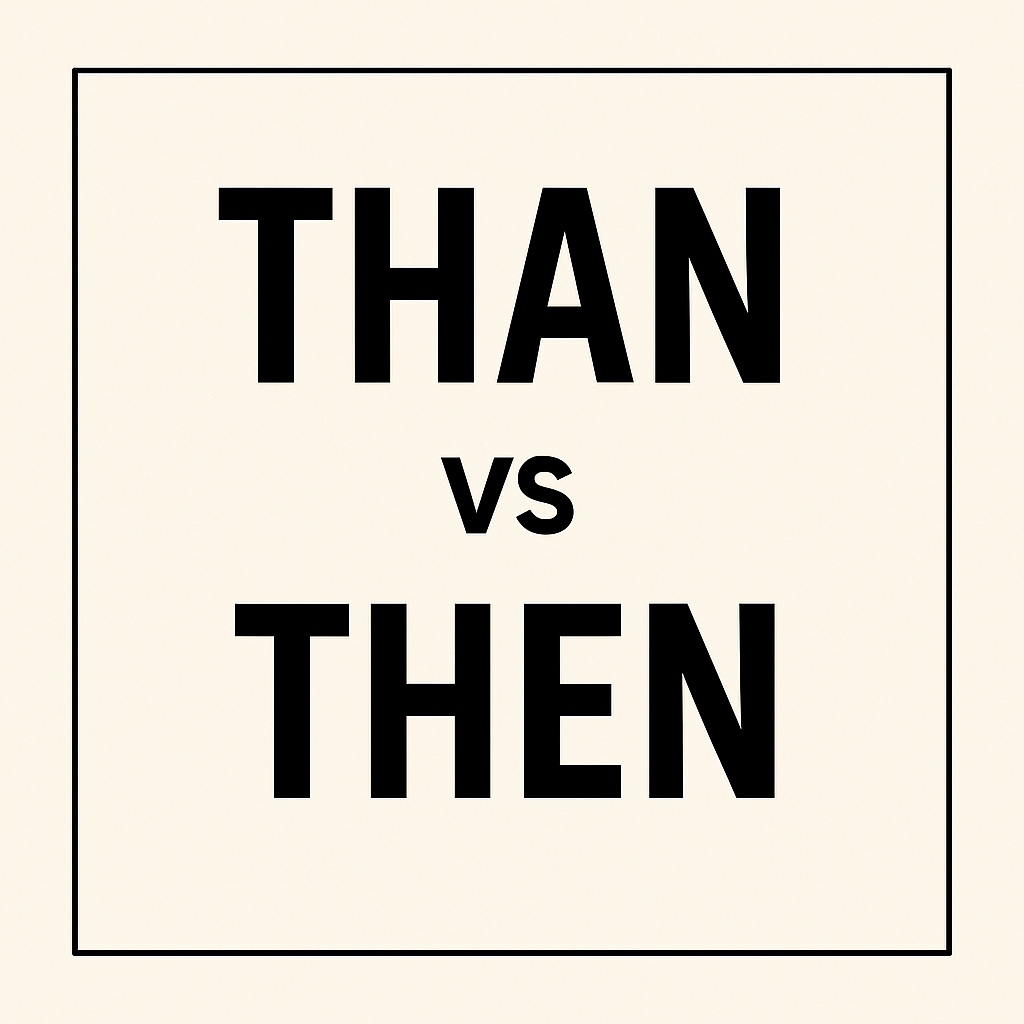Than vs Then

English can be tricky especially when it comes to word pairs that sound similar but serve very different purposes. One of the most common mix-ups is than vs then. These two short words are often confused in writing because they look and sound alike. But understanding their correct usage can dramatically improve your grammar and clarity.
“Than” is used to compare things. “Then” refers to time or the order of events. Mistaking one for the other can lead to confusing or incorrect sentences.
In this guide, we’ll explore the difference between than vs then, how to use each correctly, examples of common mistakes, and simple memory tips to help you remember the rules.
Grammatical Explanation
Than is a conjunction that introduces comparisons. You’ll usually find it paired with comparative adjectives like “more,” “less,” “better,” or “worse.” Example:
- He is taller than his brother.
Then is typically an adverb, although it can also act as a noun or adjective. It refers to a time or sequence of events. Example:
- We went to the store, and then we had lunch.
Synonyms and Usage
- Than doesn’t have direct synonyms. It’s specifically used for comparisons.
- Then can be substituted in some contexts with words like afterward, next, or at that time.
Many writers confuse than vs then because both words are short and differ by only one letter. However, they play very different grammatical roles, and using the wrong one can alter the meaning of a sentence.
Real-Life Examples
Correct Usage:
Than:
- My car is faster than yours.
- She’s more patient than I expected.
Then:
- First, we watched the movie. Then, we went out to eat.
- Back then, mobile phones didn’t have cameras.
American vs. British Usage:
There is no significant difference between American and British English when it comes to using than and then. The rules apply universally across both language variants.
Incorrect Usage:
- I would rather stay home then go out.
Correction: I would rather stay home than go out. - We’ll eat, than go for a walk.
Correction: We’ll eat, then go for a walk.
Mixing these up can cause confusion or make your sentence grammatically incorrect.
Common Mistakes
Writers often make the following mistakes with than vs then:
- Using “then” in comparisons
Incorrect: He is stronger then me.
Correct: He is stronger than me. - Using “than” in sequences
Incorrect: I’ll finish my work, than I’ll relax.
Correct: I’ll finish my work, then I’ll relax.
Quick Tip:
Use than to compare things.
Use then to talk about time or what happens next.
Memory Tips
Here’s a helpful way to remember the difference between than and then:
- Than has an “A” like in “compare.” Use it when you’re comparing things.
- Then has an “E” like in “sequence.” Use it when referring to time or order.
Another tip: Try replacing the word with “next” or “after that.” If it makes sense, the correct word is then. If you’re stating a comparison, the correct word is than.
For example:
She’s taller next me doesn’t work, so it must be than.
We ate, after that we left works, so then is correct.
With these tips, the than vs then confusion should start to fade.
Conclusion
To recap: use than when comparing things and then when referring to time or a sequence of events. Though these words look and sound similar, their meanings and grammatical functions are quite different.
Want to master more confusing word pairs? Visit our blog or read our breakdown of affect vs effect to keep sharpening your grammar skills.